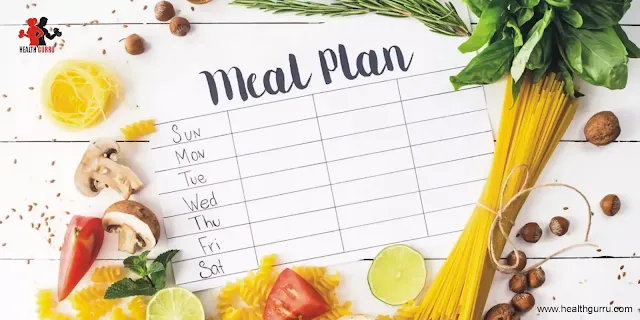Introduction:
Ramadan is a special time of year for Muslims all over the world. It’s a time of reflection, prayer, and fasting, where Muslims abstain from food and drink from dawn until sunset. While fasting can have many spiritual benefits, it can also be challenging to maintain a healthy diet and get enough calories during the month.
In this article, we’ll explore some tips and tricks for getting enough calories during Ramadan while maintaining a healthy and balanced diet. From meal planning to hydration, we’ll cover everything you need to know to stay energized and healthy throughout the month.
The Importance of Meal Planning:

One of the most important things you can do to get enough calories during Ramadan is to plan your meals ahead of time. When you’re fasting, it can be easy to get caught up in the moment and forget to eat enough food. By planning your meals in advance, you can ensure that you’re getting enough calories and nutrients to stay energized throughout the day.
Planning Your Suhoor and Iftar Meals:
Suhoor and Iftar are the two main meals of the day during Ramadan. Suhoor is the pre-dawn meal that Muslims eat before the start of the fast, and Iftar is the meal that Muslims eat to break their fast at sunset. To get enough calories during Ramadan, it’s important to make sure that your Suhoor and Iftar meals are well-balanced and nutrient-dense. This means including foods that are high in protein, healthy fats, and complex carbohydrates.
Here are some tips for planning your Suhoor and Iftar meals:
- Include a variety of nutrient-dense foods, such as whole grains, fruits, vegetables, lean proteins, and healthy fats.
- Make sure to drink plenty of water during your Suhoor and Iftar meals to stay hydrated.
- Avoid processed foods and sugary drinks, as these can cause a quick spike in blood sugar followed by a crash, leaving you feeling tired and hungry.
Eat Nutrient-Dense Foods:

In addition to planning your meals, it’s important to focus on eating nutrient-dense foods during Ramadan. Nutrient-dense foods are foods that are high in vitamins, minerals, and other important nutrients that your body needs to function properly.
Here are some examples of nutrient-dense foods that you can include in your Ramadan diet:
- Whole grains, such as brown rice, quinoa, and whole wheat bread
- Fruits and vegetables, such as berries, leafy greens, and sweet potatoes
- Lean proteins, such as chicken, fish, and tofu
- Healthy fats, such as avocado, nuts, and olive oil
By focusing on nutrient-dense foods, you can ensure that you’re getting enough calories and nutrients to stay energized and healthy during Ramadan.
Staying Hydrated During the Day:
Staying hydrated is another important aspect of getting enough calories during Ramadan. When you’re fasting, your body relies on water to help regulate your temperature, transport nutrients, and remove waste products.
To stay hydrated during the day, it’s important to drink plenty of water and other hydrating fluids during your non-fasting hours. This can include water, herbal tea, coconut water, and other non-caffeinated beverages.
It’s also important to avoid caffeine and sugary drinks, as these can dehydrate you and leave you feeling tired and sluggish.
Listen to Your Body:

Finally, it’s important to listen to your body during Ramadan and make adjustments to your diet and lifestyle as needed. If you’re feeling tired or hungry, it’s important to take a break and rest or eat something.
If you’re struggling to get enough calories or nutrients during Ramadan, consider talking to a healthcare provider or registered dietitian for personalized advice and guidance.
Conclusion:
Getting enough calories during Ramadan can be challenging, but with a little bit of planning and effort, it’s possible to stay energized and healthy throughout the month. By focusing on nutrient-dense foods, staying hydrated, and listening to your body, you can ensure that you’re getting the calories and nutrients you need to thrive during this special time of year.
FAQs
1. How many calories should I aim to consume during Ramadan?
A. The number of calories you need during Ramadan can vary depending on your age, sex, weight, and activity level. Most adults need around 2,000 to 2,500 calories per day to maintain their weight and energy levels during Ramadan.
2. What are some high-calorie foods that I can eat during Ramadan?
A. There are several high-calorie foods that you can include in your diet during Ramadan, such as dates, nuts, whole grains, lean proteins, and healthy fats like avocado and olive oil.
3. Can I eat fast food or junk food during Ramadan to get enough calories?
A. While fast food and junk food may be high in calories, they are often low in nutrients and can leave you feeling sluggish and unwell. Instead, focus on nutrient-dense foods like fruits, vegetables, whole grains, and lean proteins to fuel your body during Ramadan.
4. Is it possible to lose weight during Ramadan?
A. It’s possible to lose weight during Ramadan, but it’s important to do so healthily and sustainably. To lose weight during Ramadan, you’ll need to create a calorie deficit by eating fewer calories than you burn each day. However, it’s important to make sure that you’re still getting enough calories and nutrients to support your health and well-being.



